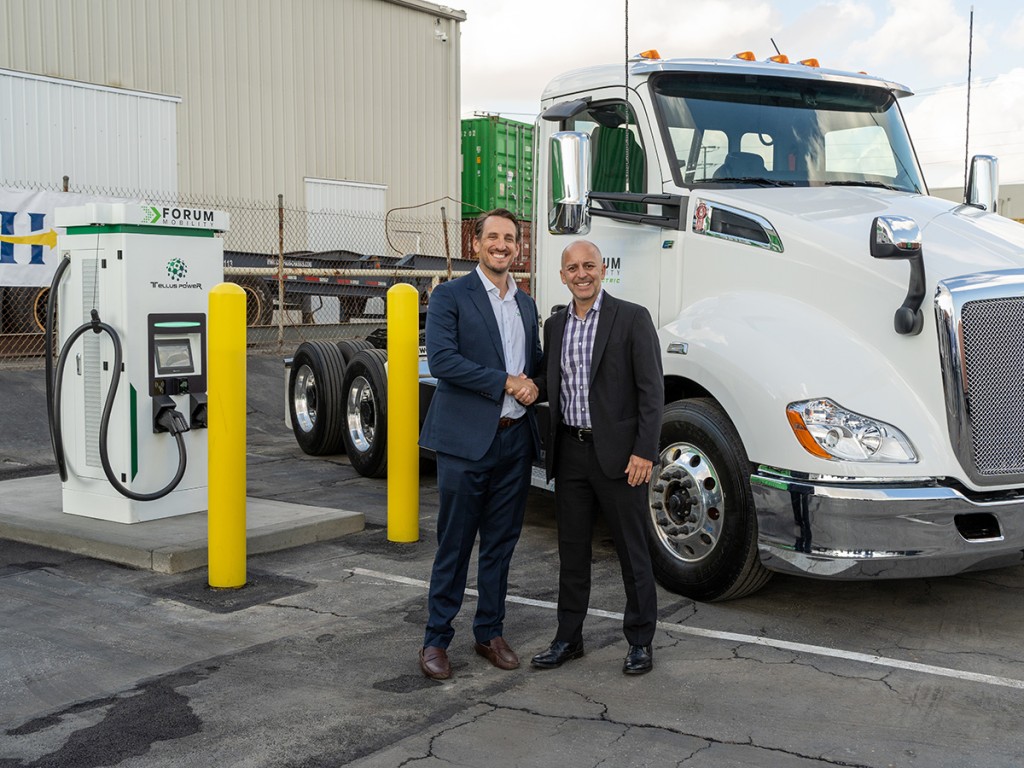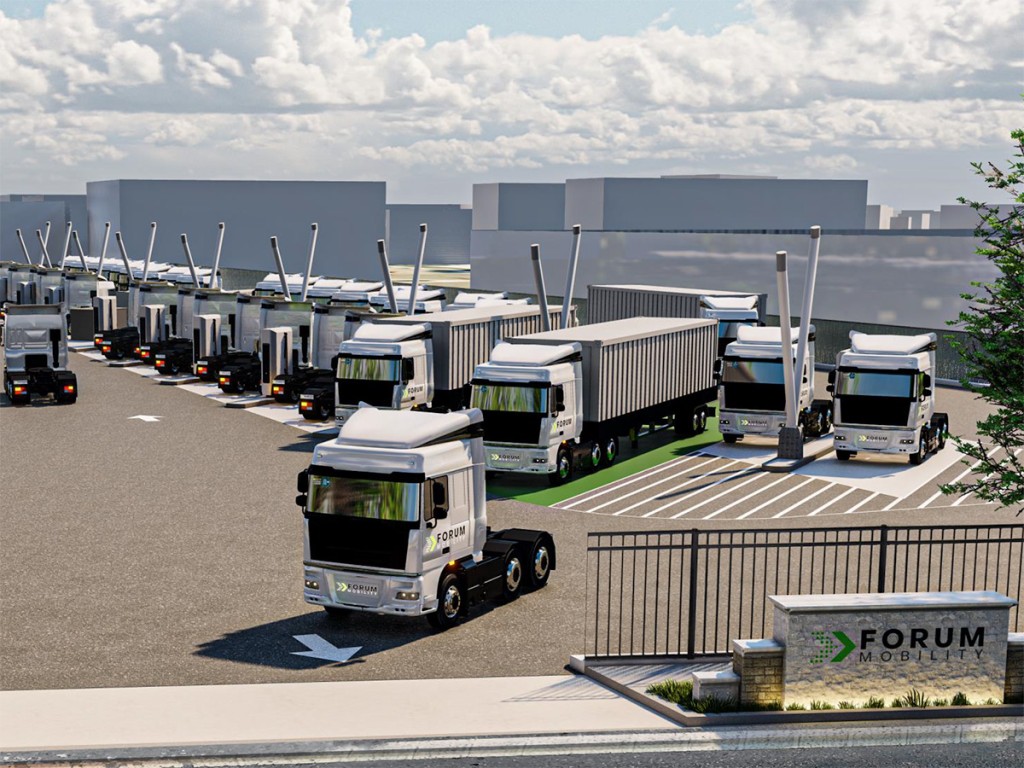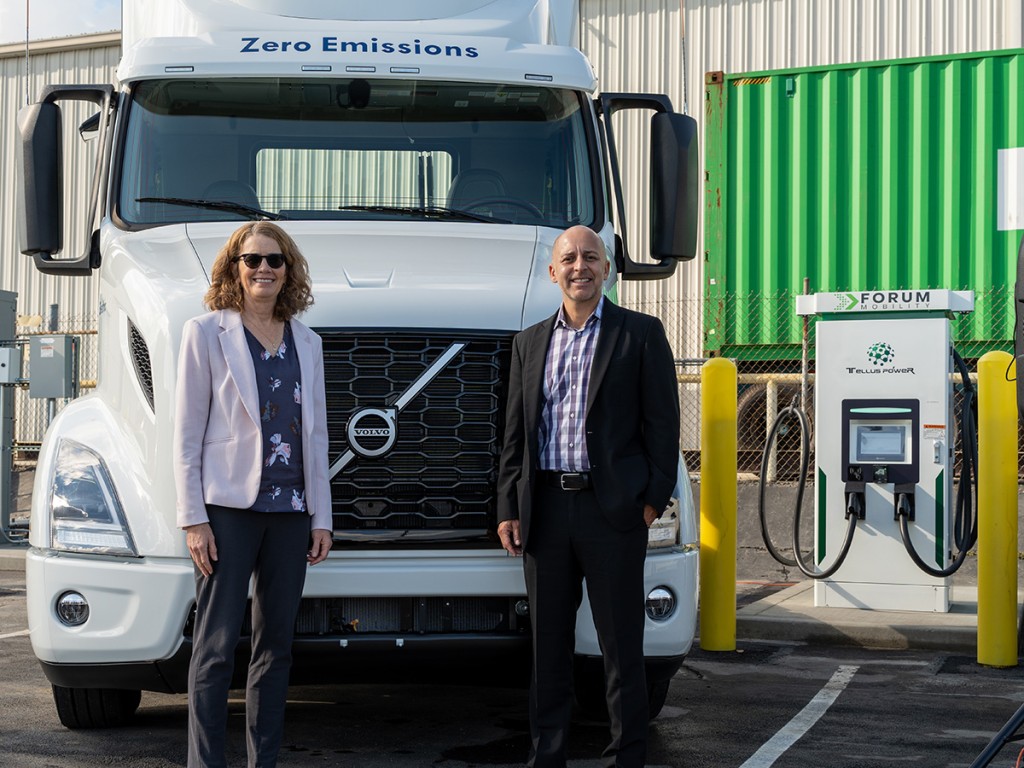In January, Amazon announced it is supporting Forum Mobility, an Oakland, California zero-emission trucking solutions provider, that is building electric truck charging stations for harbor trucking fleets and drivers.
The venture is supported by a new $400 million joint venture, led by the commercial real estate company CBRE. In addition, Homecoming Capital provided $100 million.
Forum Mobility’s investors include Obvious Ventures, Edison International, Overture, Homecoming Capital, CBRE Investment Management, Elemental Excelerator and Amazon’s Climate Pledge Fund, the announcement said.
The endorsement from Amazon signals that a major retail and logistics company is ready to make the investment in electric trucks and charging stations.
Rodrigo Prudencio, principal at Amazon’s Climate Pledge Fund said of the commitment: “To address global warming at scale, we need solutions that support the transition to electric vehicles, especially in hard-to-decarbonize sectors like heavy duty trucking. Forum Mobility’s solution will help small business owners electrify their transportation fleets, remove air pollution from California’s ports, and provide the charging infrastructure needed to support the growing use of electric trucks.”
At the January announcement, Matt LeDucq, CEO and Co-founder of Forum Mobility explained: “We are building a comprehensive charging network for heavy-duty trucks to make the transition to electrification. This network will need a lot of infrastructure and real estate, and CBRE IM is the perfect partner to help us build charging where it’s needed most. Fleets can bring their trucks to our network, or we can provide electric trucks bundled with charging. Today we can provide a Class 8 electric truck, and all its charging needs, at a monthly price that’s competitive with diesel – without the emissions… With new rules coming soon from the California Air Resources Board, we help fleets and drivers looking to make the jump to electric.”

Zero By 2035
Currently, proposed regulations from the California Air Resources Board (CARB) would require all of California’s drayage fleet – approximately 30,000 trucks – to be zero-emission by 2035. Charging infrastructure is a key ingredient for success. The California Energy Commission estimates that to comply with these and other proposed vehicle regulations, California will need 157,000 medium and heavy-duty chargers by 2030, the Forum Mobility announcement said.
Forum Mobility has identified nine sites in Northern and Southern California, focusing on the Ports of Long Beach and Oakland. The company plans to install depots capable of simultaneously charging medium and heavy-duty trucks at locations linked to the ports and along routes leading to warehouses.
Below are the planned locations of the first nine charging stations and the number of chargers under development:
- City of Long Beach - 48
- City of Compton - 52
- City of Livermore - 104
- City of Oakland - 24
- Unincorporated Rancho Dominguez - 120
- City of Fontana - 64
- City of Vernon - 80
- Unincorporated Rancho Dominguez - 112
- Unincorporated Rancho Dominguez - 120
The company says that all but the last two (the Unincorporated Rancho Dominquez sites) are scheduled to be online by the end of 2024 and the last two in 2025 for a total of “724 trucks in this tranche.” The company says these stations are “in advanced stages of development” with overnight dwell slips available and fast chargers.
For the next phase of development, Forum Mobility is planning to build charging stations at another 15 sites for 1900 trucks by end of 2027.
In an interview with AJOT, Forum Mobility’s Matt LeDucq, discussed the company’s focus on harbor trucking beginning with the Ports of Oakland and Long Beach: “We have trucks that are going in and out of the Port of Long Beach today at a facility in Long Beach proper and we are looking to finalize some projects with both the Port of Long Beach and the Port of Oakland … This is going to create a massive demand. And so, we have built the company around creating an economic and accessible solution for drayage operators to make the transition and to do this on a fixed price per month making it competitive or beating diesel prices by building a lot of charging station facilities.”
LeDucq says that a new mandate by the California Air Resources Board will require trucking companies to make the investment in electric trucks: “On April 28th, the California Air Resources Board is voting on an Advanced Clean Fleet (ACF) program. ACF will pass in California and will mandate the conversion of fleets to zero-emission.”
The Advanced Clean Fleet program designed by the California Air Resources Board is “a medium and heavy-duty zero-emission fleet regulation with the goal of achieving a zero-emission truck and bus California fleet by 2045 everywhere feasible and significantly earlier for certain market segments such as last mile delivery and drayage applications. The initial focus would be on high-priority fleets with vehicles that are suitable for early electrification, their subhaulers, and entities that hire them. The goal of this effort is to accelerate the number of medium and heavy-duty zero-emission vehicle purchases to achieve a full transition to zero-emission vehicles in California as soon as possible.”
LeDucq projects that the market in California for truck charging will be substantial: “We need $10 billion of real estate to house $10 billion worth of trucks that has near $10 billion worth of infrastructure on it just for infrastructure and just for California over the next 12 years. It’s that big of an infrastructure opportunity.”
The potential for building truck charging stations is enormous: “You’re going to have to find facilities … that have the capability of charging 2-3,000 trucks with heavy-duty chargers a day that have to be built in California between now and 2030, which means that between now and 2030 you have to build over 200 chargers a day. By 2030, we’re going to need to build 10,000 chargers in California. The California Energy Commission put out the number of 53 chargers a day for medium and heavy-duty trucks to get constructed for Advanced Clean Fleets (ACF).”
Le Ducq notes that it is not realistic to locate charging stations at the ports because there is limited space for chargers:
“I don’t think the charging can happen at the Port. For the Port of Oakland, the charging needs to happen in Livermore, French Camp, Tracy, and Manteca. For the Southern California ports (Los Angeles and Long Beach), it’s got to happen in San Bernardino and Ontario. In Southern California, the trucks are getting 150-250 miles on a charge which means you can definitely get your Santa Fe Springs or Fontana run. So, for the operator that we’re working with, that’s perfect and that’s the reason we like drayage because it’s also a good duty cycle out of the battery.”

Port of Long Beach/Los Angeles Project & Hight Logistics
In a December 7, 2022, announcement, Forum Mobility “celebrated with a ribbon-cutting for our first customer, a deal to provide five class 8 battery electric trucks and all the charging they can use, at Hight Logistics in Long Beach.”
The announcement said that attendees included California State Senator Lena Gonzalez, Long Beach Mayor-elect Rex Richardson, California Energy Commissioner Patty Monahan, California Air Resources Board Member Gideon Kracov, Long Beach Harbor Commission President Sharon L. Weissman, Hight Logistics CEO Rudy Diaz as well as Forum Mobility CEO Matt LeDucq.
The announcement cited Hight Logistics: “A family run business that leads with their values.”
The announcement went on to say that Forum Mobility was able to provide Hight with with BYD, Volvo, and Kenworth trucks “all-electric Class-8 trucks, on-site fast-chargers and all the electricity they need for zero-emission drayage.”

Port of Oakland Charging
LeDucq said that Forum Mobility is building a charging station at Livermore California, East of the Port of Oakland on the 580-freeway corridor linking the Port to warehouses and agricultural exporters in the San Joaquin Valley: “At the Livermore facility, we’ll start building this in September and we have just signed the contract with PG&E (Pacific Gas & Electric), and we’ve designed this … for overnight charging. Adjacent to it, we’re going to find some folks that can do some containers and some storage for those drivers. This is a hundred truck facility. You park your passenger in one place, and you pick up your truck in the morning, it’s fully charged and should get through the day.”
Besides Forum Mobility there has already been moves to build a charging station in the Port of Oakland. In March 2022, it was announced that a Port of Oakland container terminal operator SSA would be building a charging capability for its electric tractor fleet: “Robotic charging specialist Rocsys has signed an order of agreement with marine terminal operator SSA Marine to supply ROC-1 autonomous charging systems. The systems will autonomously charge part of the electric yard tractor fleet of SSA Marine at the International Container Terminal at the Port of Oakland.
The project is partially funded by a $50 million grant from the California Air Resources Board (CARB) to the Port of Long Beach to fund emissions-free and “near-zero” equipment and vessels at three California ports, including Long Beach, Stockton, and Oakland. According to the organizers, the Sustainable Terminals Accelerating Regional Transformation (START) project will deploy over 100 pieces of zero-emissions terminal equipment and port drayage trucks.”

CBRE Explains Truck Charging Station Support
Robert Shaw, managing director, Private Infrastructure at CBRE Investment Management noted: “The transportation sector is the largest contributor to GHG (Greenhouse Gas) emissions, and heavy-duty transportation in particular has long been considered one of the hardest to decarbonize. This marks our third investment in sustainable transportation since 2019 as we continue to execute on our strategy of investing in infrastructure assets that we believe will thrive in the new electric and digital economies. We are excited to form this strategic partnership with Forum Mobility and leverage the broader CBRE platform to supercharge the transition to sustainable, zero-emission logistics solutions.”

Follow us on social media: